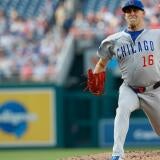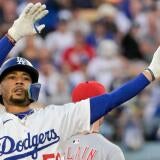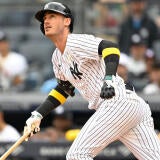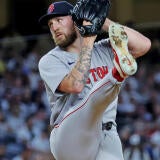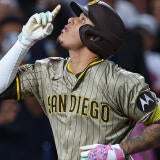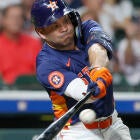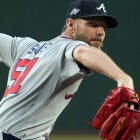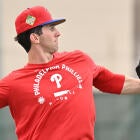
Fantasy Baseball Instant Reaction: Nationals embrace risk with Patrick Corbin deal
Patrick Corbin is coming off a huge breakout season, and the Nationals rewarded him handsomely for it. But there's still plenty of risk for Fantasy owners drafting in 2019.
The Nationals may lose Bryce Harper, but they made sure they won't leave Hot Stove season empty handed, agreeing to a reported six-year deal with free-agent pitcher Patrick Corbin Tuesday. The Washington Post first reported the signing, and subsequent reports indicate the deal will pay Corbin $140 million, with some of the money deferred.
This deal ensures the Nationals will continue to have one of the games' best rotations, with Corbin joining Max Scherzer and Stephen Strasburg at the top of the group. Corbin is coming off a career year, as he reached 200 innings for the first time since 2013 while sporting a 3.15 ERA and 1.050 WHIP, with 246 strikeouts.
This move doesn't do much to change Corbin's outlook for 2019, really. In theory, he moves to a team with a better lineup, though the Nationals might take a step back if Harper departs. However, Nationals Park is likely a bit of a downgrade in home park from Chase Field after the installation of the humidor appears to depress offense in Phoenix in 2018 — we'll need a few more years of data to determine the ultimate effects of that to say for sure.
So, the question with Corbin heading into 2019 doesn't hinge on geography. It's a much simpler question, but one that doesn't have an easy answer: Was Corbin's 2018 for real?
On the surface, the answer is an obvious and resounding yes. As good as his numbers were on the surface, Corbin might have pitched even better than his 3.15 ERA suggests; he sported a 2.47 FIP, 2.61 xFIP, and 2.91 SIERA. He emerged as one of the game's elite bat missers, striking out 30.8 percent of opposing hitters (seventh in MLB) while sporting a 15.6 percent swinging strike rate (second). Corbin also recorded an above-average groundball rate and better-than-average walk rate. All told, he really was that good in 2018.
The question is, was it sustainable? This didn't quite come out of nowhere, but it's not far off. Corbin did have a 3.41 ERA 2013, even making an All-Star game. However, he had Tommy John surgery in 2014, and came back with a 5.15 ERA in 2016, a mark he improved on to 4.03 the following season. Coming into 2018, Corbin looked like a solid pitcher, but not one who stood out in any way. How did he manage to make this leap?
With the help of his slider, of course. Corbin has always leaned on it, but he went to an extreme in 2018, throwing it 41.5 percent of the time. He mixed in a curveball and (very rarely) a changeup, but was mainly a fastball-slider guy. Only 12 pitchers used fastballs less often than Corbin in 2018, and only one pitcher used their primary breaking pitch more than Corbin. Basically, he was as breaking ball-dependent as any pitcher in baseball, and it's hard to argue with the results.
What concerns me, however, is this is usually a trick pitchers use as they age, to make up for diminishing velocity. We're witnessing Clayton Kershaw go through that transition now, and it's one that pretty much every pitcher (except Bartolo Colon, apparently) has to make at some point. It's also a trick that obviously reaches a point of diminishing returns — every pitcher retires, after all.
Corbin did lose about 1.5 mph off his heater in 2018, and the slider is so effective that it may not matter if he loses more velocity. And, at this point, however, the slider is his only real weapon.
It's a heck of a weapon, to be sure, but I'm not quite sure Corbin has a counter left if hitters figure out his current approach. He relies heavily on inducing swings on pitches out of the zone with the slider, but what happens if batters start to lay off just a little bit? In 2017, Corbin's pitch mix wasn't dramatically different (53.3 percent fastballs vs. 48.5 percent in 2018; 38.0 percent sliders vs. 41.5 percent in 2018), and the results were mostly middling.
Smart money is on Corbin continuing to be an above-average pitcher, because the approach backed up the results in 2018. This wasn't some fluke propped up by good luck. Like I said earlier: He really was that good.
I don't mind taking the risk on him as a No. 2 Fantasy starter, but I bet someone in your league is going to like him more than that — Scott White has him as a top-12 starter, for example. Corbin's track record and approach hint at more risk here than his price tag might suggest.

